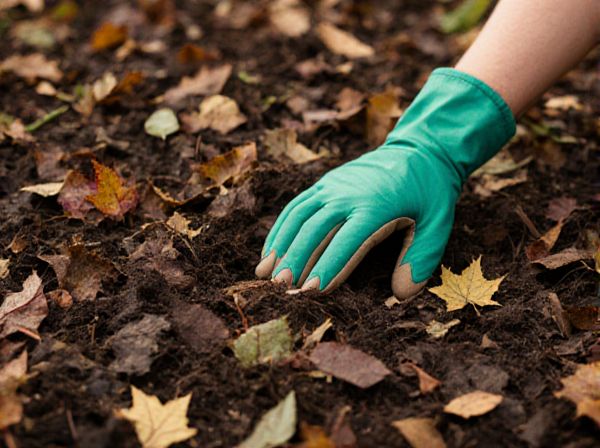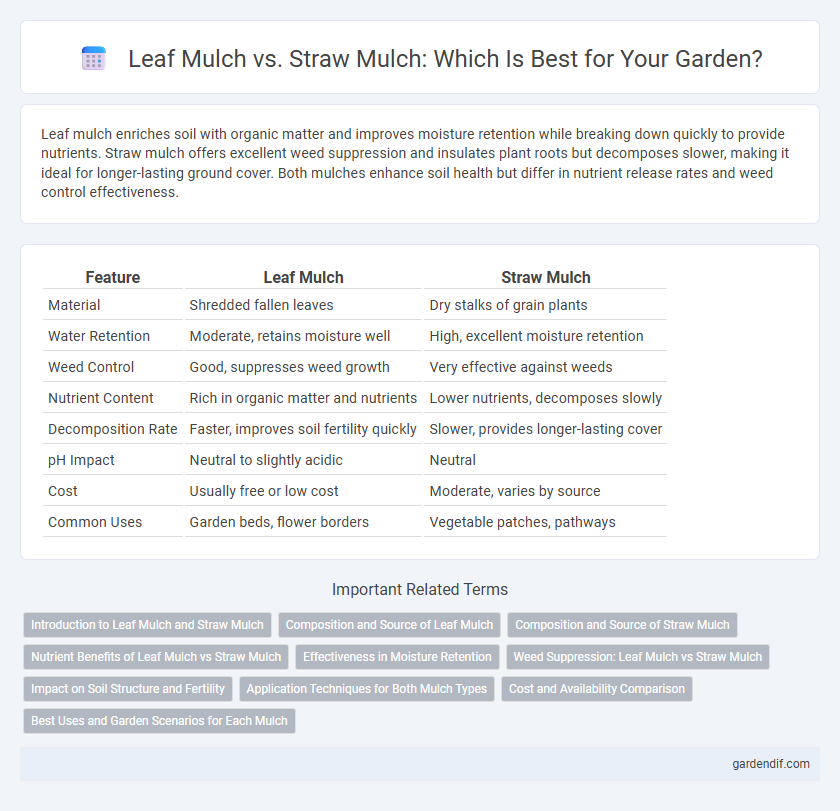
Leaf mulch vs Straw mulch Illustration
Leaf mulch enriches soil with organic matter and improves moisture retention while breaking down quickly to provide nutrients. Straw mulch offers excellent weed suppression and insulates plant roots but decomposes slower, making it ideal for longer-lasting ground cover. Both mulches enhance soil health but differ in nutrient release rates and weed control effectiveness.
Table of Comparison
| Feature | Leaf Mulch | Straw Mulch |
|---|---|---|
| Material | Shredded fallen leaves | Dry stalks of grain plants |
| Water Retention | Moderate, retains moisture well | High, excellent moisture retention |
| Weed Control | Good, suppresses weed growth | Very effective against weeds |
| Nutrient Content | Rich in organic matter and nutrients | Lower nutrients, decomposes slowly |
| Decomposition Rate | Faster, improves soil fertility quickly | Slower, provides longer-lasting cover |
| pH Impact | Neutral to slightly acidic | Neutral |
| Cost | Usually free or low cost | Moderate, varies by source |
| Common Uses | Garden beds, flower borders | Vegetable patches, pathways |
Introduction to Leaf Mulch and Straw Mulch
Leaf mulch, derived from decomposed tree leaves, enhances soil fertility by providing essential nutrients and improving moisture retention. Straw mulch, made from dried stalks of cereal plants, offers excellent weed suppression while maintaining soil temperature. Both types contribute to organic matter enrichment but differ in texture, nutrient content, and decomposition rate.
Composition and Source of Leaf Mulch
Leaf mulch is composed primarily of shredded fallen leaves, rich in organic matter and nutrients such as nitrogen, phosphorus, and potassium. It originates naturally from deciduous trees and shrubs, providing a sustainable, biodegradable source that enhances soil fertility and moisture retention. In contrast, straw mulch consists mainly of dried stalks of cereal crops like wheat or barley, offering a lighter texture but typically lower nutrient content than leaf mulch.
Composition and Source of Straw Mulch
Straw mulch is composed primarily of the stalks of cereal crops such as wheat, barley, and oats, making it an agricultural byproduct that is widely available and sustainable. Its coarse texture and high carbon content help improve soil aeration and water retention while slowly decomposing to enrich soil organic matter. Compared to leaf mulch, which consists of decomposed leaves rich in nitrogen, straw mulch provides a balanced nutrient profile ideal for protecting soil in garden beds and agricultural fields.
Nutrient Benefits of Leaf Mulch vs Straw Mulch
Leaf mulch enriches soil with higher levels of nitrogen, phosphorus, and potassium as it decomposes faster, boosting nutrient availability for plants. Straw mulch primarily provides carbon-rich organic matter but offers fewer immediate nutrients, making it more suitable for soil structure improvement rather than rapid nutrient supply. Incorporating leaf mulch enhances soil fertility more effectively, promoting healthier plant growth through nutrient cycling.
Effectiveness in Moisture Retention
Leaf mulch exhibits superior moisture retention due to its dense, organic composition that helps regulate soil temperature and reduces evaporation effectively. Straw mulch provides good moisture retention but tends to dry out faster because of its coarse texture and lower density. For optimal soil hydration, leaf mulch is preferred in gardens where prolonged moisture conservation is critical.
Weed Suppression: Leaf Mulch vs Straw Mulch
Leaf mulch excels in weed suppression due to its dense, mat-like structure that blocks sunlight effectively, preventing weed seed germination. Straw mulch offers moderate weed control but can be less effective as it often contains weed seeds and provides less coverage density. Choosing leaf mulch enhances garden weed management by creating a robust barrier against invasive plants.
Impact on Soil Structure and Fertility
Leaf mulch enhances soil structure by decomposing rapidly, increasing organic matter and microbial activity that improves soil fertility. Straw mulch provides moderate soil protection but decomposes slower, contributing less directly to nutrient enrichment. Both mulches help retain moisture, but leaf mulch is more effective in boosting nutrient cycling and overall soil health.
Application Techniques for Both Mulch Types
Leaf mulch is best applied by shredding leaves to create a fine, even layer that retains moisture and suppresses weeds effectively around perennials and shrubs. Straw mulch requires a thicker, looser application to insulate soil and protect crops like vegetables from temperature extremes and erosion. Both mulches benefit from being spread 2 to 4 inches deep, avoiding direct contact with plant stems to prevent rot and pests.
Cost and Availability Comparison
Leaf mulch is typically more cost-effective and readily available, as fallen leaves can be collected on-site or gathered from local sources for free or minimal expense. Straw mulch tends to be more expensive due to its agricultural production and often requires purchase from specialized suppliers, which may limit availability based on geographic location. Leaf mulch also decomposes faster, making it a sustainable option for gardeners seeking an economical and accessible mulching material.
Best Uses and Garden Scenarios for Each Mulch
Leaf mulch excels in enriching soil nutrition and moisture retention, making it ideal for vegetable gardens and flower beds where organic matter improves fertility. Straw mulch is best suited for pathways, around delicate seedlings, and in garden scenarios requiring excellent weed suppression and aeration without compacting the soil. Both mulches serve unique roles: leaf mulch boosts microbial activity and soil structure, while straw mulch protects soil from erosion and temperature fluctuations.
Leaf mulch vs Straw mulch Infographic

 gardendif.com
gardendif.com